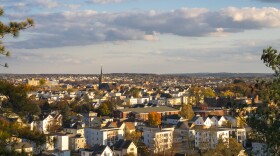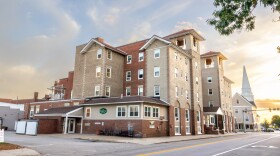This story was originally produced by the Concord Monitor. NHPR is republishing it in partnership with the Granite State News Collaborative.
At the end of the month, Edmund McGahey plans to load up his U-Haul with the American flag neatly rolled behind his front door, take his wind chimes down from his front porch, pack his eight potted Christmas cacti, and leave for Texas.
With an outstanding mortgage he has no choice but to hand the keys to his double-wide manufactured house within Great Brook Village over to his bank. He can’t sell it due to rising park rental fees.
McGahey, a 74-year-old Vietnam War veteran, envisioned the over-55 community as an affordable place to retire when bought the home in May of last year for $80,000.
When he first looked at the property, the rent for the lot of land beneath the home was $528 per month. By the time his loan was approved and he moved in, it increased to $829. As of July 1, rent on the plot was up to $965, and when a prospective buyer looked into making an offer on the house, the property manager said the new monthly fee would soon grow to over $1,000.
McGahey’s moving in with his daughter for health reasons, but if he stayed put, he’s not sure how he’d pay his bills. After an out-of-state investor, Oakshire Capital, purchased the park in 2021, rent increases soon followed.
Great Brook Village is not an anomaly in these rising prices. Across the country, investors have purchased manufactured housing parks in wide swaths. Residents can be cash cows for park owners, as they own their houses but only rent the land their homes sit on.
With a $1,050 monthly mortgage, the rent practically doubles McGahey’s bills.
“Bottom line is I have to move, but I am caught between a rock and a hard spot,” he said. “My credit is going to be totally destroyed. It was a very hard decision to make, but I have to do what’s best for me.”
Other residents in the park have hired a lawyer to contest the rent increases. Median home sale prices in New Hampshire recently hit $500,000 and rental vacancy rates remain below 1 percent statewide. With this landscape, they fear they have nowhere else to go.
Meanwhile, McGahey said he has no choice but to walk away.
“He’s holding me hostage here because I cannot sell my house and I have to get out of here,” McGahey said. “I never thought I’d be in this kind of predicament where I’m just going to turn the house back over to the bank. I just can’t do it. The stress alone is enough to drive anybody crazy.”
'A lot of capital flowing in that direction'
When McGahey moved into his three-bedroom, two-bathroom double-wide home, he replaced the old carpets, put a fresh coat of paint on the walls and spruced up the landscaping.
He hung a framed photo of him and his late wife, Ann, above a small table in the living room. In the drawer, McGahey saved bills and notices from the park. The latest notice from the property manager – Matt Dennehy, who did not return requests for comment in this story – warned that monthly fees were increasing to $965 beginning July 1. It still had the blue masking tape used to stick it to his door.
The trend of investor interest in these parks began in 2015, according to George McCarthy, the president and CEO of the Lincoln Institute of Land Policy, a nonprofit that looks at trends nationwide. Since then, about 30 percent of manufactured housing sites across the country have changed hands to investors looking to turn a profit.
“Manufactured housing communities are considered to be the best-performing reach in the real estate investment trust sector,” he said. “So there’s been a lot of capital flowing in that direction, unfortunately for people who live in manufactured housing parks.”
In 2021, the 5.8-acre Great Brook Village was sold to Oakshire Capital for $4.2 million. Horvath and Tremblay, an investment real estate company based out of Massachusetts, arranged the sale.
Oakshire Capital manager Bradley Pereira did not reply to email and phone requests for comment.
McGahey didn’t realize his park was investor-owned when he purchased it. Meanwhile, longtime residents watched the sale happen, hopeful that a new owner would maintain the park as was.
Bob Denutte, 70, has lived in Great Brook Village for 14 years, a few doors down from McGahey. When he moved in, rent was a little over $300, he said. New rent for prospective buyers is now $1,195.
“He lied to everybody and tried to make him look good and said he would be a perfect owner and take care of everybody’s issues,” he said. “It was a scheme.”
Often manufactured houses are referred to interchangeably as “mobile homes.” To McCarthy, that’s a misnomer, because once a house is purchased it’s rarely moved. The cost of picking up the structure and delivering it somewhere else costs thousands of dollars.
If McGahey was staying in state, it would be unlikely his house would follow him if he left the park.
“I didn’t know anybody up here at all when I first moved in. They said it was a great place to live,” he said. “People are fantastic but everybody is up in arms about the rent increases. He’s destroying my life and getting away with it and there is absolutely nothing I can do about it.”
'It's not a good situation'
When an investor purchases a park, the change in ownership can often lead to a downturn in services – from trash collection to lawn care.
That has been the case at Great Brook Village, as well. Residents were recently asked to pay an additional trash collection fee. Denutte has asked for branches to be trimmed near his home with no response.
One recently fell through his roof and cost him more than $3,000 to repair.
For nearly 20 years, Bruce Buckingham, 68, has lived in the park, in a double-wide home with a deck.
Erosion on the property has caused his deck to drop and his driveway to collapse. He is in an ongoing dispute with the park owner over whose responsibility it is to fix, arguing that he does not own the land where these problems are present. Building permit records from 2019 indicate that the deck needs to be replaced.
“He’s turned a deaf ear on it, he just won’t hear of it,” he said.
Buckingham has written to the Attorney General’s office, state representatives, manufactured home associations and the congressional delegation about his issue. The unanimous response has been to get an attorney, which he previously did but could not afford to retain.
“It’s very frustrating for people like us on fixed incomes that can’t afford an attorney,” he said. “It’s not a good situation.”
Resident-owned alternatives
Mike Cox’s house is no different than those at Great Brook Village. It’s a double-wide, three-bedroom, two-bathroom manufactured home in a neighboring park in Belmont, he purchased for just over $80,000.
Since 2005, Cox has seen a $20 increase in the rent on his lot, which currently sits at $370 a month – he lives in the Lakes Region Manufactured Housing Cooperative, a resident-owned community since 2000. Next year, the park mortgage will be paid off, shedding another expense for residents.
A movement has been afoot in New Hampshire where residents band together to buy and own the land as a cooperative, giving themselves control over decisions, like lot rent. They elect leaders to manage the park bylaws and have collective input on decisions.
When a park is for sale, as Great Brook Village was in 2021, residents are offered the first right of refusal to purchase it. At the time, they passed on the offer, fearing that the cost to maintain the park themselves would equate to $900 in rent.
At the time, Denutte said Pereira, the owner of Oakshire Capital, visited and reassured residents about the sale so they backed down.
“If they had known this was going to happen I’m sure they would have done it,” said Denutte. “I’m sure they would have made more of an effort to purchase it.”
Over the last four decades, the expansion of resident-owned communities has become a staple of affordable housing in the state and the most prolific solution to maintaining these communities, according to the Lincoln Institute’s McCarthy.
New Hampshire has led the nation in this trend, with the first cooperative established in Meredith in 1984. Nearly 150 exist across the state. In the Merrimack County area, out of a total 58 manufactured housing parks, 22 are resident-owned.
These articles are being shared by partners in The Granite State News Collaborative. For more information visit collaborativenh.org.







